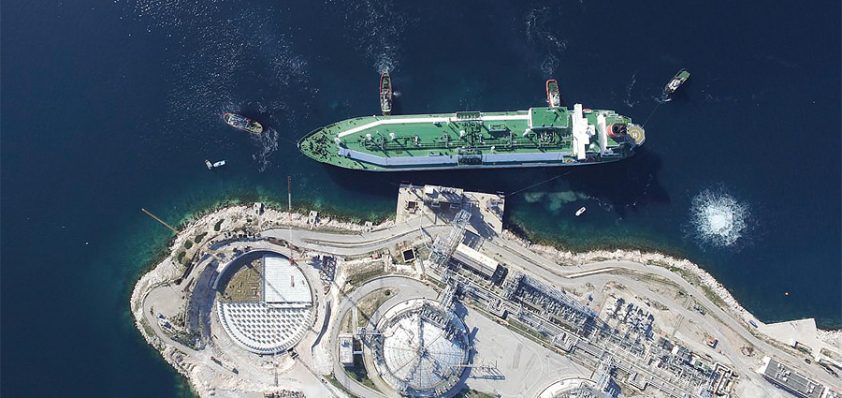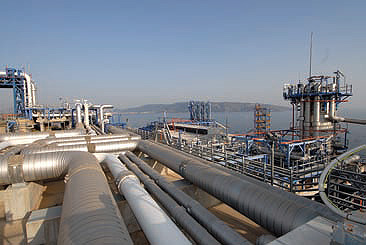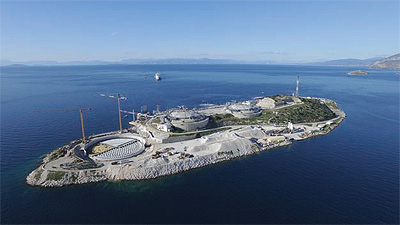
DESFA Enhances Greek Energy Security with LNG Terminal
A natural solution
Guided by a vision to act as a leading national gas transmission system operator while contributing to social prosperity and public interest, the National Natural Gas System Operator (DESFA) SA manages a large national gas network across Greece.
The company was established during March 2007 in accordance with law 3428/2005, relating to the liberalisation of the natural gas market. This law itself was introduced in response to a  need to further the harmonisation of Greek legislation in line with the European Union directive 2003/55/EC (part of the Second EU Energy Package) concerning the development of common rules for the internal market for natural gas. Through the implementation of this law DESFA was formed as a subsidiary of the Greek public gas supply company, DEPA SA, by means of divestiture via spinoff. Under the European Union directive 2009/73/EC (part of the Third EU Energy Package), DESFA was certified as an Independent Transmission Operator (ITO) in September 2014.
need to further the harmonisation of Greek legislation in line with the European Union directive 2003/55/EC (part of the Second EU Energy Package) concerning the development of common rules for the internal market for natural gas. Through the implementation of this law DESFA was formed as a subsidiary of the Greek public gas supply company, DEPA SA, by means of divestiture via spinoff. Under the European Union directive 2009/73/EC (part of the Third EU Energy Package), DESFA was certified as an Independent Transmission Operator (ITO) in September 2014.
Since its establishment, DESFA has taken ownership and full control of the Greek national natural gas system (NNGS) which consists of the National Natural Gas Transmission System and the liquid natural gas (LNG) Terminal in the islet of Revithoussa. DESFA is fully responsible for the operation, maintenance, exploitation and development of the NNGS, ensuring that the NNGS is economically efficient, technically sound and integral to serve the needs of natural gas users in a safe and reliable manner. An important milestone in the operation of the NNGS was the publication of the Network Code for third-party access to the National Natural Gas System during April 2010, which was followed by berthing of the first LNG ship from a non-DEPA user at the Revithoussa LNG terminal in May of the same year, signalling the opening-up of the Greek Gas Market.
In this framework, DESFA offers regulated Third Party Access services in a transparent and non-discriminatory way, already offers and further develops a range of non-regulated services to a number of clients and cooperates with neighbouring TSOs for making integration at regional level a reality.
The NNGS maintained by DESFA transports gas from the Greek-Bulgarian border (upstream TSO: BULGARTRANSGAZ) and the Greek- Turkish border (upstream TSO: BOTAS) to consumers in continental Greece. The system consists of the main gas transmission pipeline and several additional branches incorporating border metering stations at Sidirokastro, near Serrers and at Kipi, near Evros; a compression station Nea Mesimvria, Thessaloniki; natural gas metering and regulating stations; natural gas control and dispatching centres at Patima Magoulas near Athens and Nea Mesimvria near Thessaloniki; the operation and maintenance centres of Sidirokastro Border Station, Northern Greece, Eastern Greece, Central Greece and Southern Greece; and a efficient remote control and communication system. The main transmission pipeline encompasses a total length of 512km with a design pressure of 70 Bar(g), extending Greek-Bulgarian border at Promachonas to Attica, while transmission branches accounting for a total length 947 km extend from the main transmission pipeline to supply natural gas to the regions of Eastern Macedonia, Thrace, Thessaloniki, Platy, Volos, Trikala, Oinofyta, Antikyra, Aliveri, Korinthos, Megalopoli, Thisvi and Attica.
 With the EU representing the largest importer of natural gas in the world, diversification is a vital component in securing energy security with cargos of LNG available from a wide variety of supplier states worldwide. DESFA operates one of Europe’s largest LNG facilities at its Revithoussa LNG terminal, which serves as the entry point of LNG for the Hellenic gas transmission system. The terminal was commissioned in February 2000 and receives LNG by carrier, stores it or vaporises it and injects the gas into the NNGS. The terminal has a total storage capacity of 130,000m3 and after a second upgrade the facility’s capacity will be increased to 225,000m3. The project is currently ongoing and will benefit both competition and the security of supply.
With the EU representing the largest importer of natural gas in the world, diversification is a vital component in securing energy security with cargos of LNG available from a wide variety of supplier states worldwide. DESFA operates one of Europe’s largest LNG facilities at its Revithoussa LNG terminal, which serves as the entry point of LNG for the Hellenic gas transmission system. The terminal was commissioned in February 2000 and receives LNG by carrier, stores it or vaporises it and injects the gas into the NNGS. The terminal has a total storage capacity of 130,000m3 and after a second upgrade the facility’s capacity will be increased to 225,000m3. The project is currently ongoing and will benefit both competition and the security of supply.
Presently, the Revithoussa jetty allows for unloading one vessel at a time, while its unloading system consists of three liquid Z-3101A/B/C, one vapour return arm Z -3102 LNG and a piping system for transferring LNG to storage tanks. The maximum LNG unloading rate is 7.250m3/h. Two cryogenic storage tanks 65,000m3 each are used to temporarily accommodate the LNG before its degasification and export to gas grid. LNG is transferred and stored at a temperature of -160°C and at around atmospheric pressure. Two submarine gas pipelines (2×24”) with a length of 510m and 620m connect the LNG Terminal export pipe with Agia Triada metering station, which is the entry point to the Hellenic gas transmission system.
Investments by DESFA into the development of the Revithoussa LNG terminal, as well as into the rest of the company’s infrastructure, represent an important component in safeguarding Greek energy security and strengthening the country’s economy. Internal changes within the business include software improvements, an internal development programme and the implementation of a new auditing system. These investments will enable DESFA to pursue its ambition to create an integrated gas corridor that will stretch from Greece, Central Europe and ultimately end in the Baltic region, which will greatly increase the independence of these countries from relying solely on Russian gas imports. As the company enters into a new year, the development of LNG and associated services will continue to be a vital consideration throughout Greece and beyond.
DESFA
Services: Greek national gas transmission system operator